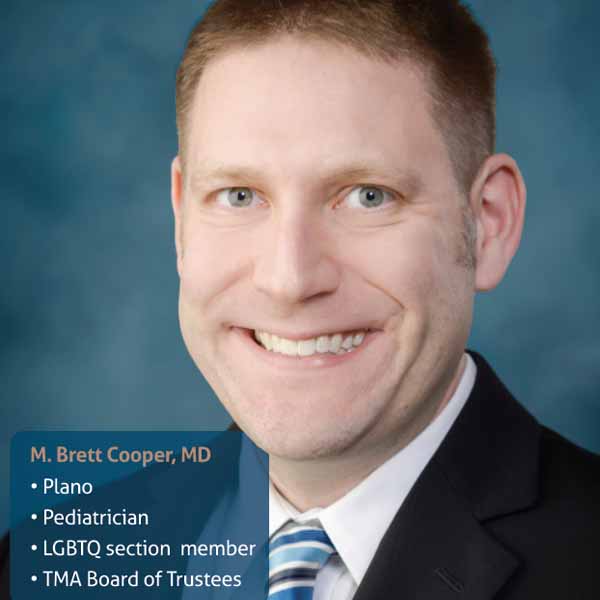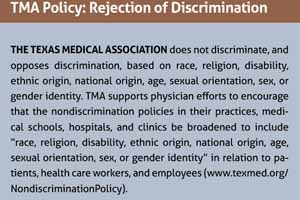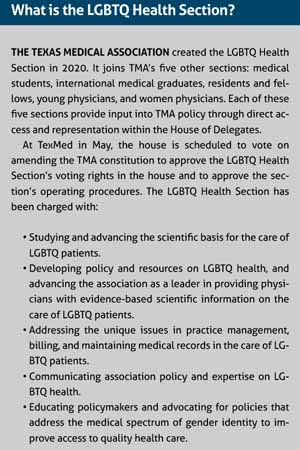
In 2019, an out-of-state medical organization called on the Texas Medical Board (TMB) to encourage transgender young people to avoid medical help as part of their gender transition. Instead, the group asked TMB to push those patients toward scientifically unproven “conversion therapy.”
The Texas Medical Association replied immediately. TMA aggressively opposed any “potentially harmful, unproven therapies,” such as conversion therapy, that are designed to change the sexual orientation of LGBTQ young people, then-TMA President David Fleeger, MD, said in prepared testimony to TMB (see www.texmed.org/LGBTQyouth2019).
TMA’s leadership on this issue sprang directly from the passage of 2018 House of Delegates policy that rejects discrimination, says M. Brett Cooper, MD, a member of the section and the TMA Board of Trustees. (See “TMA Policy: Rejection of Discrimination,” page 27.)
More importantly, this incident – and others like it – helped spur the creation of the LGBTQ Health Section by the TMA House of Delegates in 2020. (See “What is the LGBTQ Health Section?” page 26.)
“That’s an example of why this policy and why this section are important for TMA as we adapt to an ever-evolving patient-care landscape,” said Dr. Cooper, an assistant professor of pediatrics at UT Southwestern Medical School.

Ensuring quality care
The LGBTQ Health Section is first and foremost designed to help ensure quality health care for a population that faces a “high degree of stigma,” says John Carlo, MD, incoming chair of the LGBTQ Health Section and CEO of Prism Health North Texas, the largest nonprofit AIDS service organization in North Texas. “Also, there are very specific health concerns that do need to be continuously addressed that are specific to the LGBTQ community.”
Research shows that people who are sexual minorities have higher adjusted rates of asthma, cancer, heart disease, chronic obstructive pulmonary disease, hypertension, kidney disease, obesity, smoking, and stroke than people who identify as heterosexual, according to a Feb. 5, 2021, report in the Morbidity and Mortality Weekly Report put out by Centers for Disease Control and Prevention (tma.tips/LGBTQhealth2021).
“We have to address higher rates of sexually transmitted infections [among LGBTQ patients]. We have to address different health screening recommendations. And particularly with nonbinary gender, there’s a whole range of medical treatments and interventions,” Dr. Carlo said. “So there’s a lot we could stand to learn about better health care for this community.”
Because of the stigma they face, LGBTQ patients frequently hold off on seeing a physician, which can lead to greater health problems, he adds. Given this, physician education about LGBTQ patients becomes that much more important. (See “A New Understanding,” September 2019 Texas Medicine, pages 20-25, www.texmed.org/ANewUnderstanding.)
“If you made a mistake on sexual orientation or gender identity, it already puts you behind in being able to establish that relationship of trust,” he said.
The LGBTQ Health Section serves as an information clearinghouse for other physicians in a variety of ways, such as holding panel discussions at TexMed. (See TMA Resources, below.)
“When we did education meetings, we were stopped in the halls by other physicians who said we really wish we could learn more about this,” Dr. Carlo said.
The section also can be a resource for LGBTQ physicians and medical students who are concerned about discrimination, Dr. Cooper says. Most face tough professional choices about how much or how little to reveal about their sexual orientation or gender identity.
Because those answers can vary depending upon geography or specialty, members of the LGBTQ Health Section can counsel medical students on how to proceed, says Dr. Cooper, who’s often asked for his advice.
“Their big concern is: ‘I may be a great medical student – I’ve got great grades, I’ve got great projects, I’ve been a member of organizations – but is a residency program going to rank me lower strictly because I identify as LGBTQ?’”

Open to all
Many LGBTQ Health Section members join because they are LGBTQ or because they have friends or family members who are, Dr. Carlo says. But the presence of non-LGBTQ physicians shows that it is open to any TMA members with an interest in LGBTQ issues.
“This is not just for people who are LGBTQ to join the section – this is really for everybody,” he said. “We certainly welcome all members who want to be involved.”
Denton obstetrician gynecologist Joseph Valenti, MD, a member of TMA’s Board of Trustees, says he belongs to the LGBTQ Health Section in part to better understand the health problems that affect his transgender patients.
“I have a very diverse practice,” he said. “And in learning how to take care of my trans patients, I realized there were a lot of things I didn’t know – things they were teaching me as I was going.”
Physicians and other health care professionals have shown greater awareness about the needs of LGBTQ patients in recent years, but there is plenty of room for improvement, Dr. Valenti says.
“There’s still a lot of education that needs to happen,” he said. “The other day, I tried to send a trans patient for a mastectomy and the physician said, ‘I don’t do that.’ … I know if I’m running into it, other doctors are running into it. And if other doctors are running into it, the patients are definitely running into it.”
Like Dr. Valenti, a “decent subset” of New Braunfels family physician Emily Briggs, MD’s patient population is LGBTQ, and joining the section has helped her confront some unique practice management issues.
Even well-intentioned physicians often run into bureaucratic obstacles, she says. For instance, until 2020 her electronic health record (EHR) provider did not offer a way to identify a patient as transgender, and such a designation would remind her staff to address a patient using the appropriate name and pronouns.
“It’s simple things like that that allow a patient, especially in primary care, to feel like they’re at their medical home,” Dr. Briggs said. “We need to respect people and help them feel comfortable in that environment.”
She also had to train her staff to ask the transgender identification question so that it is recorded in the EHR.
“I would say other physicians who have not been personally affected – themselves or their family – by this misidentification or are not aware of it … wouldn’t think to even see if their [EHR] does that,” she said.

The accumulated expertise in the LGBTQ Health Section also makes it a great rapid-response team, Dr. Cooper says. The effort to promote conversion therapy before the TMB in 2019 was just one of many similar efforts to curtail or infringe on physician care for LGBTQ patients.
In this session of the Texas Legislature, the section has been active in advocating on First Tuesdays (www.texmed.org/FirstTuesdays) and testifying before committees, Dr. Briggs says.
“Now that we have this section, the TMA is better mobilized to find physician members who are very aware of these topics and can very quickly go and speak with legislators, whether that’s a hearing or one-on-one at First Tuesdays,” she said.